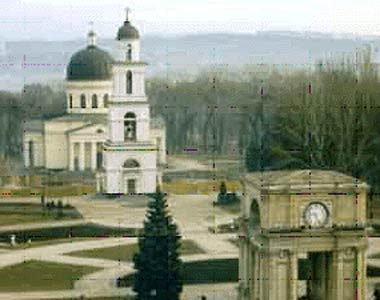
GUAM SUMMIT: A NEW LEASE ON LIFE (Part 2)
Publication: Eurasia Daily Monitor Volume: 2 Issue: 78
By:

The meeting of presidents of GUAM countries (Georgia, Ukraine, Azerbaijan, Moldova) in Chisinau on April 21-22 has the potential to turn GUAM from a virtual into a real and possibly effective organization by capitalizing on the ongoing transformation of the regional environment.
Four factors, directly bearing on GUAM’s prospects, have changed that environment fundamentally since the time of GUAM’s failures. The first change is NATO’s and the European Union’s enlargement, tipping the domestic political balance in GUAM countries decisively toward the Western orientation. The second factor is a growing awareness of Euro-Atlantic interests in the broadly defined Black Sea region to which the GUAM countries belong. The third factor is the advance, however uneven, of institutional reform and democratization in the region, coupled with an improving economic performance. The fourth factor is the conclusive failure of Russian-led integration projects and demise of the CIS, contrasting with the active role of such countries as Poland, Lithuania, and Romania — all three invited to this GUAM summit — in anchoring the region to the West.
A meeting of the four member countries’ National Security Council Secretaries in Kyiv (Interfax-Ukraine, April 16), followed by a meeting of the long-dormant GUAM Committee of National Coordinators in Chisinau (Moldpres, April 18), set the agenda for the summit. It will seek a new relevance and missions for GUAM regarding energy transit, security cooperation, and common efforts toward Euro-Atlantic integration.
Ukraine has taken the lead in promoting the vision of an energy transit corridor from the Caspian Sea via Azerbaijan, Georgia, the Black Sea, and Ukraine to Europe. President Viktor Yushchenko has outlined this vision most recently in his Warsaw University speech (Interfax-Ukraine, April 12), and it was also in the focus of the preparatory meetings in Kyiv and Chisinau. This goal had figured prominently on GU(U)AM’s agenda in the late 1990s, but was based on an overestimation of Azerbaijan’s potential to supply multiple pipelines with its oil and gas. In fact, Azerbaijan’s export volumes of oil and gas had to be pre-committed almost entirely to the Baku-Ceyhan and Shah Deniz-Erzurum pipelines in order to maximize their commercial viability. Thus, fulfillment of GUAM’s aspirations to provide a transit corridor depends entirely on securing oil and gas from Kazakhstan and Turkmenistan. The Ukrainian, Georgian, and Azerbaijani presidents have recently initiated discussions with Kazakhstan regarding oil deliveries from that country, via Baku and Supsa or Novorossiysk, for the Odessa-Brody pipeline. In the same context, GUAM countries jointly with some EU member countries can urge the EU to return to its TRACECA project (Transport Corridor Europe-Caucasus-Central Asia) as a policy priority.
Regarding security cooperation, GUAM expects to focus on conflict settlement in Transnistria, Abkhazia, South Ossetia, and Karabakh. The group will probably continue its earlier common effort to obtain international acceptance of a broader definition of terrorism, conflating the latter with “armed separatism” and ethnic cleansing. GUAM will almost certainly maintain its practice of speaking with a single voice in international organizations on issues bearing on the territorial integrity of states, inviolability of recognized borders, evacuation of foreign troops, return of refugees, and generally ensuring the operation of international law in this region.
Ukraine tends to regard GUAM to some degree as a forum for the assertion of Ukrainian regional leadership. In this context, Kyiv has unilaterally prepared a conflict settlement plan for Transnistria, intending to have it promulgated by the GUAM summit in Chisinau. Ukrainian National Security and Defense Council Secretary Petro Poroshenko presented his long-prepared plan to the Moldovan side only on April 18, having failed to consult any government within or outside GUAM. Contrary to some media reports, Ukrainian President Viktor Yushchenko had not discussed Poroshenko’s or any plan with President George W. Bush during Yushchenko’s recent U.S. visit. The proposal and the procedure serve neither Moldovan nor Ukrainian security interests, as some Ukrainian analysts privy to the document have noted (Oleksandr Shushko and Natalya Belitzer in Zerkalo Nedeli, April 8). A Moldovan delegation rushed to Kyiv for discussions on April 19 hoping to dissuade the Ukrainian side from introducing this discordant note at the GUAM summit.
The preparatory meetings in Kyiv and Chisinau (see above) decided to create a provisionally named Working Group on Euro-Atlantic Integration. Poland, Lithuania, and Romania are natural partners for consultations within this group. Considering these countries’ possible relationship with GUAM as a whole, the Chisinau summit seems likely to change the organization’s name to one reflecting a new geographic and functional scope.




